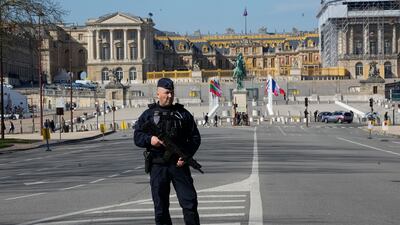Live updates: follow the latest news on Russia-Ukraine
European leaders are meeting near Paris for a two-day summit to show a determination to support Ukraine and set goals to reduce dependence on Russian energy exports.
French President Emmanuel Macron is hosting the bloc's leaders at Versailles for one of the most important EU gatherings in years as the war waged by Russia on Ukraine enters a third week.
Since the attack, the EU agreed has to spend €450 million ($500 million) on buying weapons for Ukraine as well as setting out a long-term rearmament plan. Germany and Sweden have said they will raise defence spending above 2 per cent of gross domestic product. Others have also said they plan to boost military resources.
“In stepping up European defence, we must find a consensus within the EU, that sometimes the best way of achieving peace is the willingness to use military strength," Estonian Prime Minister Kaja Kallas said.
The summit's conclusions are expected to have leaders agree in Versailles that they “must bolster resolutely [their] investment in defence capabilities and innovative technologies” and to continue efforts to make the EU "a stronger and more capable security provider”.
Other measures prioritise a shift in energy systems to lower yet further the continent's reliance on Russian supplies of gas and oil.

"It also means that we have to discuss our vulnerabilities in terms of our dependency on Russian oil and Russian gas," said Mark Rutte, the Dutch prime minister. "I would not plead to cut off our supplies of oil and gas today from Russia. It's not possible, because we need the supply and that's the uncomfortable truth.
"We can do more to get the green agenda going, to decarbonise our economies, also making use of all the reforms in the European green package as we have agreed earlier."
Two weeks into the war, divisions among leaders have started to surface on integrating Ukraine and severing energy ties with Moscow.
Ukrainian President Volodymyr Zelenskyy wants his country to quickly become an EU member, but an agreement on that point will not be achieved this week, despite more prodding from Foreign Minister Dmytro Kuleba for the bloc "to make history” by expanding in the face of conflict.
The Ukrainian fast-track attempt has received warm support in Eastern European countries, but EU officials say the process could take years, with unanimity among current members required to allow a newcomer into the club.
“This will not happen in the short term, because this is a whole process taking many years,” Mr Rutte said.
Another key deterrent to a hasty decision is the specific EU treaty clause that if a member falls victim to armed aggression, the other EU countries have an obligation to aid and assist it by all the means in their power.
“The chance of all member states agreeing to admit Ukraine while it is at war with Russia is virtually zero, as it could trigger conflict with Moscow,” said Luigi Scazzieri, a senior research fellow at the Centre for European Reform.
On energy, all agree that the EU should reduce its dependency on imports of Russian gas, oil and coal while accelerating the green transition. The EU imports 90 per cent of the natural gas used to generate electricity, heat homes and supply industry, with Russia supplying almost 40 per cent of EU gas and a quarter of its oil.
This week, the European Commission proposed to diversify natural gas supplies and speed up renewable energy development in an attempt to reduce EU demand for Russian gas by two thirds before the end of the year.

EU leaders are expected to agree on that, but it is highly unlikely that they will follow Washington's lead and unanimously endorse a full embargo on Russian oil and gas imports. France will not defend what it considers a radical measure and German Chancellor Olaf Scholz has made clear he opposes the idea.
Efforts to agree on a boycott are complicated because some EU countries, including Germany and Italy, are much more dependent on Russia than others. Poland gets 67 per cent of its oil from Russia, while Ireland receives only 5 per cent.
Mr Rutte said it was essential that the EU should “not [go] hastily in the direction of a complete ban on gas and oil from Russia".
“Because we are very much dependent, that’s the painful reality,” he said. “[A ban] would have huge ramifications on all our economies ... even up to Ukraine itself, because we still have to find the diesel to put in the trucks which are driving into Ukraine to help them.”
Some countries could, however, decide to go solo and impose an embargo even without an EU deal, since members are free to make their own energy choices.
Divergences on how the the EU should tackle the energy price surge because of the Ukraine conflict remain ahead of the meeting. Greece has proposed a six-point plan including a price-cap mechanism to address the surging energy prices, but that idea has been dismissed as unrealistic by other members.
“Collectively, it is a mission impossible," an EU diplomat said. “Private sector has long-term investment deals, that would lead to court cases. It is very complicated."


